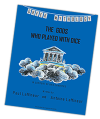Sisyphus was the first king of Corinthia (known as Ephyrae) and thought that he could trick the gods, a really naive assumption and a sure way to be doomed.
According to Homer, it is written in The Iliad, book VI , that Sisyphus was the son of Aeolus, the god of the winds. He was also supposed to be the father of Odysseus, probably because the two men were known to be extraordinarily cunning.
Sisyphus was famous for his trickery and wicked intelligence, but his greatest success was to cheat death and Hades himself, not once but twice, justifying Homer’s description of him as «the most cunning of men» Iliad VI -153.
In his first death, Sisyphus once in the Underworld succeeded to capture Thanatos, the personification of Death, and chain him up so that no human died thereafter, which of course could not be accepted by the gods as only they were immortals.
Ares was obliged to negotiate with Sisyphus, he had to let him go back to the living world so Thanatos (Death ) was freed to continue his sad but necessary work.
The second death of Sisyphus was even more insulting for the gods.
After dying for the second time Sisyphus succeeded to convince Hades to let him go back to the living.
Sisyphus had plotted with his wife that she would not provide the usual offerings and sacrifices that were due on her husband’s death. He knew that the only weakness of Hades was the love he had for his wife. He also knew that Persephone had a kind heart. So he convinced the lovely Persephone to let him go for just the time for him to oblige his ungrateful wife to perform the necessary rituals and sacrifices.
Once released, he explained that promises were only binding if they were genuine and stayed happily away from the Underworld.
He lived to a very, to an extremely old age as Thanatos had been traumatised by being made prisoner and always delayed the time to take him to the Underworld.
Zeus had to intervene.
Sisyphus was setting a bad example, demonstrating to the already cunning mortals that it was possible to trick the gods. That could not be allowed. The punishment of Sisyphus had to be a warning for any “hubris-stricken “ mortal.
The punishment would have to be horrific.
It would be : Sisyphus will have to roll an immense boulder up a hill. Just when the boulder got to the top of the hill, it would roll back down to the bottom, forcing Sisyphus to an eternity of unending frustrations.
In Homer’s Odyssey, the hero Odysseus go down into the Underworld and testifies about Sisyphus and his eternal punishment:
“Then I witnessed the torture of Sisyphus, as he wrestled with a huge rock with both hands. Bracing himself and thrusting with hands and feet he pushed the boulder uphill to the top. But every time, as he was about to send it toppling over the crest, its sheer weight turned it back, and once again towards the plain the pitiless rock rolled down. So once more he had to wrestle with the thing and push it up, while the sweat poured from his limbs and the dust rose high above his head.”
Odyssey, Book 11:593)

